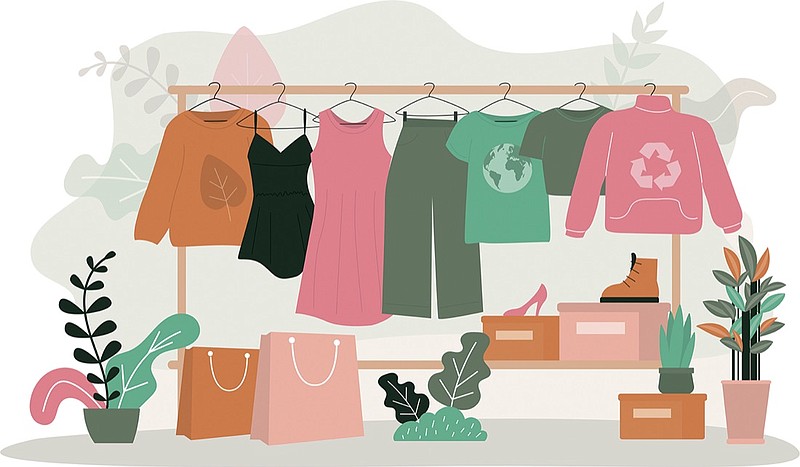Consumers are evolving to become more mindful of what they buy.
Since 2014, sustainable product sales have increased by nearly 20%, according to a global Nielsen report. A third of consumers say they're willing to pay 25% more for such products - while Gen Zers say they'll pay 50-100% more - according to a 2019 Computer Generated Solutions survey.
The purpose-driven shopper seems to be inspired by several events, from the minimalist movement to concerns over climate change and environmental degradation - and even in response to the pandemic. In a 2020 global survey by management consultancy firm Accenture, 60% of respondents reported having made more ethical purchases since the start of the pandemic.
As the trend gains momentum, there are now more ways than ever to be a conscientious consumer. Here are a few tips.
CLOTHING AND HOME GOODS
Forgo fast fashion
Why it matters: Since 2000, clothing production has doubled while garment lifespans have decreased by 36%, according to the Ellen MacArthur Foundation. Meanwhile, a 2019 report by Sheffield international research institute found that while more companies are making commitments to living wages, it rarely translates to real change.
However, ethical fashion brands can be found. Here are three websites and apps that allow you to quickly and confidently find them.
- Good on You rates fashion brands using a 500-plus point system, evaluating how each company treats people, animals and the planet. Ratings range from "We Avoid" to "Great."
There's an app for that
These days there's an app for everything - even boycotting brands that don't speak to your values. The app Buycott has become popular as a tool for shoppers to make informed decisions about what they're buying. Download it from the App Store or Google Play, and use it to scan products in the store. Information will pop up about the product and its history, helping you to make informed choices about where your money's going.
- Project Just is a catalog of fashion companies verified to "do no harm" to the people and the environment in their supply chains. The catalog is compiled via rigorous research of self-reported and third-party reported information on each brand.
- Done Good lets you discover and buy ethical, sustainable and organic products, from clothing to home goods. The app itself is a Certified B Corp, which means it has been thoroughly vetted and verified to be doing good for people and the planet.
More on B Corp
B Corp is a nonprofit that measures a company's responsibility. Companies awarded the status have proven their commitment to creating an inclusive, sustainable economy, with an emphasis on protecting the environment, workers or customers. A few well-known Certified B Corp companies include Patagonia, Ben & Jerry's and Allbirds. See the complete directory at bcorporation.net.
FOOD
Avoid air-freighted fruits and veggies
Why it matters: According to a report by the Fraser Institute, "food miles," or the long-distance transportation of food, account for a relatively small proportion of carbon emissions - with one exception: produce transported by air. According to the BBC, air-freighted food creates 100 times more emissions than alternatives.
You can avoid air-freighted produce by avoiding out-of-season fruits, veggies and herbs that have a short shelf life and have traveled long distances (check the label for the country of origin). Common examples include berries, green beans, peas and asparagus. If you're not sure what's currently in season, visit your local farmers market - and remember, you can't go wrong by shopping local. (See a complete list of local farmers markets online at timesfreepress.com/news/chatter.
Did you know?
According to the University of Michigan's Center for Sustainable Systems, food production accounts for 68% of all industry-related emissions, while food transportation accounts for 5%. If you want to lessen your food's footprint and get more bang for your buck - eat less meat, which has a larger carbon footprint than any other agricultural crop.
Buy sustainable seafood
Why it matters: The United Nations Food and Agricultural Organization estimates that 85% of marine fish stocks are exploited or overfished. Moreover, the pollution caused by commercial fisheries wreaks real havoc. Every year, between 500,000 to 1 million tons of fishing gear end up in the ocean, according to the World Wildlife Fund.
To be sure your fish is sourced sustainably, look for the blue MSC label on food packaging and restaurant menus. The ecolabel indicates that the fish can be traced back to healthy populations that have been sustainably fished. A few global companies with brands carrying that label are McDonald's, Aldi and Walmart.
Support local farmers at any one of these area markets.
- Bradley County Farmers Market: 3110 Peerless Road, Cleveland, Tennessee, Open Tuesdays, Thursdays and Saturdays through the fall. - Brainerd Farmers Market: 20 Belvoir Ave. at Grace Episcopal Church. Open 10 a.m to noon through November. - Chattanooga Market: First Horizon Pavilion, 1926 Carter St., Open 10 a.m. to 5 p.m. Saturdays and 11 a.m. to 4 p.m. Sundays - Collegedale Market: Collegedale Commons, 4950 Swinyar Drive. Open 4:30-7:30 p.m. Tuesdays through late October. - Lookout Farmers Market, Red Bank: Red Bank United Methodist Church, 3800 Dayton Blvd. Open 3-6 p.m. Wednesdays. - Main Street Farmers Market: 1804 Chestnut St. Open 4-6 p.m. every Wednesday yearround.
